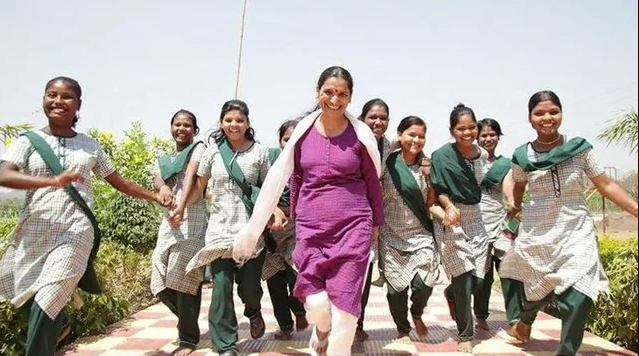The Dark Realities of Women Trafficking VII: NGOs Transform Lives of Trafficking Survivors
Total Views |
Many organisations work to rescue and rehabilitate the victims, but it is not an easy task. Some self-driven or self-motivated individuals established NGOs to work. One of the examples is of Rescue Foundation established by Mrs Triveni Acharya and her husband Mr Balkrishna.

Mrs Triveni worked as an investigative journalist and then, noticed a young girl outside a brothel when she was on her visit to the area to cover a story of an actor who worked for the red light area by donating money. She found that she was from Nepal and was compelled to be a sex worker.
An employee of Mr Balkrishna coincidently confided that he was in love with a girl who was kept in the area by force. Mr Balkrishna was an ex-army man, and Mrs Triveni too was fearless, they decided to rescue the girl. She was found but 15 more girls cried for help on the occasion. This motivated them to establish the foundation. Since then the NGO rescued more than 5000 girls.
The team works on the issue relentlessly, they receive missing reports from partner NGOs, police departments and parents.
A holistic rehabilitation programme is designed that includes counselling, healthcare, vocational training and some formal education. After the completion of the legal process, it helps in repatriation too.
SHAKTI SAMUHA
This organisation was established in 1996 by a small group of human trafficking survivors. The story refers back to one event of rescue of girls in Mumbai. Some belonged to Nepal, but the fear of HIV deterred the government from accepting the girls ultimately 7 organisations working in the field could manage to bring them back. WOREC ( an organisation ) in Nepal conducted a rehabilitation programme for them. 15 girls completed it and realised that it certainly was not their fault to be trapped in the tragic situation. Together they started SHAKTI SAMUHA with the motto ' Turning tears into Power ', and officially registered it in 2000.
It attempts to ensure Justice for the victims, conducts various programmes to empower victims. It works at the international level too.
It successfully could provide shelter to 1027 approximately. It runs groups for adolescents, trafficking survivors, a network for women working in the entertainment industry, and parents. Five shelter homes, transit homes, and rehabilitation centres are part of the activities of the institution. Out of 15 districts where SHAKTI SAMUHA works, in 10 districts formal education support is offered. Repatriated 145 survivors ( women and children ) could be managed to Bharat. The cases are registered in court also.
It wants a dignified life for the survivor women who are in vulnerable situations. They should not be discriminated against and need to enjoy the same rights as any other member of society. For this the Sanstha wants them to participate and lead the campaign.
To achieve it, the Sanstha intends to have skill-based programmes which would give them a sustainable source of income. It wants to get some necessary changes in laws also. It engages society with awareness programmes. More safe houses are in need, and the survivors need to get integrated with society also.
Legal services along with employment and counselling services too should be provided.
For the effective measures and implementation of various programmes coordination with international organisations is also essential. Shakti Samuh is working very hard on all these fronts.
Trafficking of children: Need For Victim-Cenric Trauma-Informed counselling by Yasmin Manji
HAART ( Awareness Against Human Trafficking ) is an NGO based in Nairobi, Kenya, founded in 2010 by lawyers, missionaries and humanitarians led by Radoslaw Malinowski. The article is based on the interview with Yasmin Manji.
She carefully elaborated on the point of mental health concerns of children at HAAT. Children usually talk about their experiences related to trafficking as well as their lives. There are interpersonal relationship conflicts and behavioral and academic concerns. It is observed that they suffer from acute stress, post-traumatic stress disorder, major depressive disorder, generalized anxiety disorder and schizophrenia.
People still label the mental problems as possed or witchcraft in Kenya. Children don't easily open up about their trauma, as they don't trust people because they feel betrayed and hurt. Carefully the rapport is to be established by winning their trust. Once it is done they gradually start talking. These are children between the ages of 6 to 18 years.
Counsellors use their techniques and therapies to help them heal. They attentively listen to them and deal with great caution. The counsellors are trained, they remain non-judgmental and emotionally considerate.
Children are taught to be disciplined using positive ways. Experts are hired to help children and come out of the trauma.
Many institutions are working throughout the world to help and save children.



